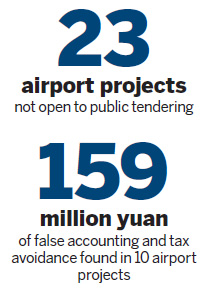Airport graft hits roof: auditors
While China's airport building boom during the past five years has boosted local economies, it has also led to the take-off of a series of graft and environmental problems, the country's top audit body said on Monday.
Ten airport projects across the country cost taxpayers 159 million yuan ($24 million) in false accounting and tax avoidance, the National Audit Office (NAO) said.

And a total of 23 airports spent 1.94 billion yuan on projects that were not open to public tendering, even though they were supposed to be, the office said, implying contracts were open to abuse.
"Relevant government departments are investigating further in accordance with the law and will ... find out who is responsible and hold them accountable," it said in a statement on its official website.
The NAO said 32.4 billion yuan had been spent in 10 provincial-level regions on building or revamping 53 airports by the end of 2009. The audit focused on 31 key airports that benefited from 94.4 percent of the investment.
The airport building boom came as part of China's efforts to stimulate domestic demand - primarily through encouraging infrastructure building - with the investment of 4 trillion yuan during the global financial downturn in 2009.
The audit result was based on the reading of 359 project contracts, or 20 percent of the total number of contracts signed with the 31 airports, the NAO statement said.
Irregularities in the tendering process were especially prominent at Daqing Saertu Airport, in Northeast China's Heilongjiang province, where the cost of work was double what was expected because of inflated contracts, the audit office said.
An engineer, who declined to be identified, told China Daily on Monday that "monitoring of money spent became a mere formality as the city (Daqing) was rushing to finish building the airport as a gift to celebrate China's 60th anniversary".
"They had to spend more to hire extra workers and to urgently order equipment ahead of plans to bring forward the end of construction," he said.
Five other airports were named as having snagged large chunks of construction money by filing multiple applications, the NAO said.
And contractors or suppliers to nine airports issued false invoices or made informal acknowledgment of debts worth about 100 million yuan to avoid taxes, it added.
In addition to financial misconduct, the audit office also said there were other adverse impacts from the airport construction boom.
Many new airports were accused of opening before they had completed their final environmental impact studies and of dumping wastewater in nearby rivers and fields.
Shen Kui, a professor in administrative law at Peking University, said the 1.5 trillion yuan in stimulus investment that was directed at improving infrastructure was open to abuse back in 2009.
"Because, in that urgent situation, the money needed to be spent fast," he said.
"This scandal should prompt us to reflect on how to trade off between the effective implementation of the central government's strategy and the standards and rules of tendering."
China earmarked more than 68 billion yuan during the past five years on building or expanding 53 airports and, despite the problems encountered, the process has been worth it, the watchdog said.
"Airport building has, to a definite degree, driven regional economic development and improved the local investment environment," it said, adding that subsidies to airports in remote areas had boosted growth and created almost 60,000 jobs.
 0
0 







Go to Forum >>0 Comments